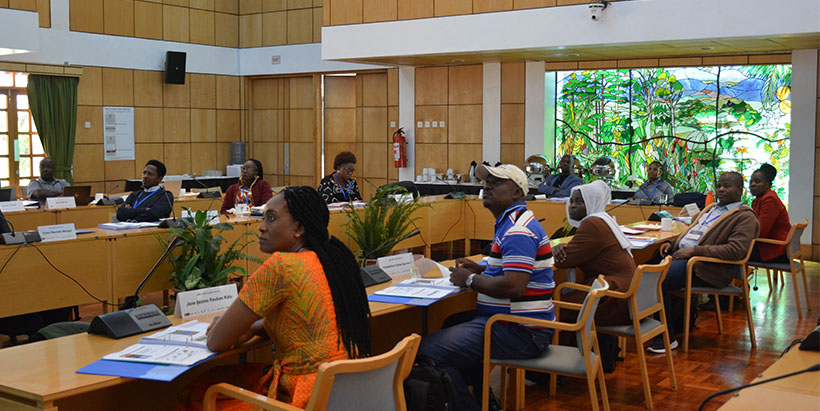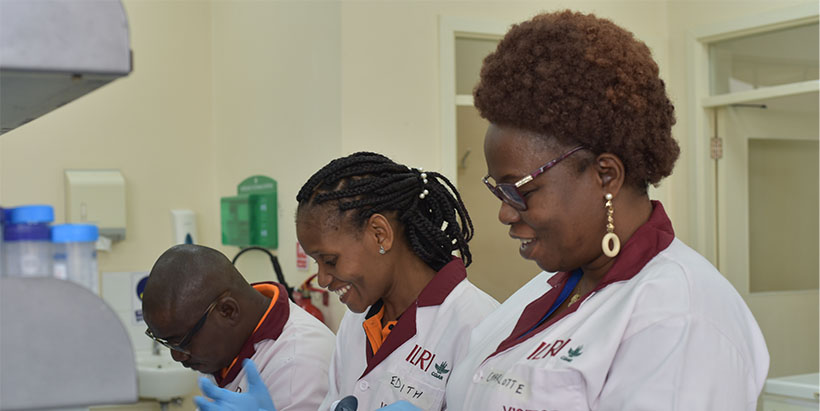Nairobi, Kenya
7 February 2025
 Class III course participants and their instructors.
Class III course participants and their instructors.
IITA–CGIAR, a member of the African Orphan Crops Consortium (AOCC) in partnership with the University of California, Davis (UC Davis) and the Innovative Genomics Institute (IGI) at UC Berkeley, has officially launched the third cohort of its renowned African Plant Breeding Academy (AfPBA) CRISPR training program in Nairobi, Kenya. The program equips African molecular scientists with cutting-edge knowledge, skills, and tools to revolutionize agriculture across the continent.
The AfPBA CRISPR Class III, commencing on 20 January 2025, will provide 11 selected scientists from five African countries with advanced training in the know-how of genome editing using CRISPR-Cas technology. The initiative is designed to empower participants to develop more resilient crops to climate change, pests, and diseases—critical for addressing Africa’s food and nutritional security challenges.
“We are committed to equipping Africa’s scientists with the skills they need to tackle the pressing challenges facing smallholder farmers. The AfPBA CRISPR course represents a vital step toward fostering agricultural innovation and ensuring the resilience of African food systems,” said Dr Leena Tripathi, Director, IITA Eastern Africa Hub and Genetic Innovation Science area and Lead, IITA Biotechnology Program.
 Participants listen in during the introductory sessions of the course.
Participants listen in during the introductory sessions of the course.
The CRISPR training course is structured into three sessions to ensure a comprehensive learning experience:
- Session 1: 20-31 January 2025
- Session 2: 28 April – 10 May 2025
- Session 3: 29 September – 10 October 2025
Coordinated by UC Davis, the sessions will be held at the World Agroforestry (ICRAF) and the International Livestock Research Institute (ILRI) campuses in Nairobi. The hands-on training will be held in the IITA lab at the BecA/ILRI hub.
With participants from Benin, Burkina Faso, Ghana, Kenya, and Nigeria, the program encourages women scientists to apply, fostering gender equity in agricultural research and innovation.
Since inception, the AfPBA CRISPR program has trained 21 scientists from 9 countries – Burkina Faso, Ethiopia, Ghana, Kenya, Malawi, Morocco, Mozambique, Nigeria, and South Africa – who are now leading transformative projects in their respective countries. These alumni are advancing national agricultural strategies, enhancing crop productivity, and contributing to sustainable food systems.
 Class III fellows in the lab starting the practical aspect of the course.
Class III fellows in the lab starting the practical aspect of the course.
The course focuses on key staple and orphan crops essential to African farmers’ livelihoods. After completing the course, participants gain hands-on experience with CRISPR tools and receive ongoing mentorship to establish gene-editing programs at their home institutions.
The AfPBA CRISPR program is sponsored with generous support from several donors, including Stephen M. Badger, Grantham Foundation, Syngenta Foundation for Food and Agriculture Research (FFAR), Bayer, and UM6P Ventures, covering all costs for participation. The program also benefits from partnerships with global leaders in biotechnology, including IITA, IGI, and UC Davis, ensuring world-class expertise is available to African scientists.
“By empowering scientists with cutting-edge tools like CRISPR, we are enabling them to tackle complex agricultural challenges and contribute to the sustainable development of food systems across the continent,” said Dr Allen Van Deynze, Director of the Seed Biotechnology Center at UC Davis and Scientific Director of the AOCC.
“This training is the first of its kind to impart knowledge, skills, and tools to accomplish gene editing in crop plants to national program scientists in Africa,” said Dr Rita Mumm, who oversees capacity building and mobilisation at the AOCC and directs the African Plant Breeding Academy.
This program is the first CRISPR hands-on training course in Africa. It will run for five years and empower 50+ scientists to use CRISPR technology for crop improvement.
The AfPBA CRISPR program represents a bold step in addressing Africa’s agricultural challenges. By fostering innovation, the program builds the capacity of scientists and drives the broader mission of building a resilient and sustainable future for African agriculture.
To learn more about the AfPBA CRISPR course, visit:
https://africanorphancrops.org/ and https://pba.ucdavis.edu/afpba-crispr-course
Inquiries can be directed to Dr. Rita Mumm at ritamumm@illinois.edu or
Dr. Leena Tripathi at L.Tripathi@cgiar.org